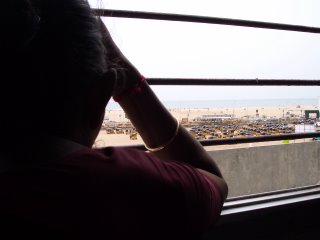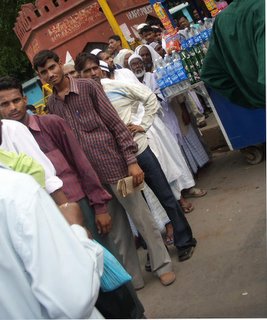 Women's Feature Service, February 6th 2006. (Also published at: http://www.boloji.com/wfs5/wfs548.htm)
Women's Feature Service, February 6th 2006. (Also published at: http://www.boloji.com/wfs5/wfs548.htm)
By all indicators, she is a successful woman. Her career in the booming Delhi retail market is taking off, she enjoys her work, and she has a loving family. Like still water that runs deep, Jyoti’s scars aren’t perceivable to most; only those closest to her are aware of the violently jarring images from her past that continually shape her present. And she doesn’t like getting close to people.
Jyoti was only 5 years old when she first encountered Harish, the man who would sexually abuse her every day for the next 7 years. “It’s hard for most people to understand what it means to be a survivor of child abuse. They think that because there are no visible signs of any ‘attack’, it’s not worth bothering about. They don’t understand that though it doesn’t continue any longer, it affects everything that I do,” she says.
Jyoti isn't alone in feeling this way. “The long-term effects of sexual abuse," says Anuja Gupta of RAHI (Recovery and Healing from Incest), a Delhi-based support centre for adult women survivors of child sexual abuse,"can permeate into every area of a woman’s life and affect the ways she thinks, acts, feels and behaves.” Through a diverse array of services aimed at raising awareness about CSA, RAHI aims to break the silence surrounding incest in India and has pioneered efforts to bring this largely stigmatized and taboo subject into the mainstream. “People in our society often harbor the myth that incest is an issue of slum people or poor people. It is important for people to understand that it has nothing to do with education or wealth,” she adds.
Jyoti grew up in an upper-middle class Marwari family in a small, conservative town in Uttar Pradesh. She was sent at a young age to the first English-medium school in the region, located in a larger town nearby. In order to ensure that Jyoti adjusted well to the school, a tuition teacher called Harish, a friend of Jyoti’s cousin, was appointed to tutor Jyoti and her brother.
She soon failed the first standard.
“I still remember how, even as a young child, I dreaded waking up each morning because the first thing I could think of was, 'How can I escape from the clutches of that man today?' But I knew he would come to our tuition room that evening, as he did everyday, and sit near me to ‘teach' me. And then there was no escaping from the hand that would creep under the study-table to touch me in a way that disgusted me, from the big stick that he never failed to use to discipline my brother and I,” Jyoti recounts.
At school, she couldn’t interact normally with other children nor could she concentrate on her schoolwork. Seeing the carefree lives led by other children her age aroused in her feelings of sorrow, jealousy, and even hatred. Constantly tortured by the thought of her tuition teacher, she struggled with schoolwork and often just barely passed her exams. Though she despised Harish’s presence, Jyoti couldn’t bring herself to discuss the sexual abuse with anyone. She felt hurt, worthless, and very alone.
Jyoti recently told a few family members about the sexual abuse she faced as a child. Though it revived difficult memories of the past, she knows that speaking out about the abuse has begun to slowly unravel the layers of hurt that seemed embedded inside her.
“Since the abuse takes place in silence, for women who have been sexually abused as children, speaking out about it is a way to break the silence and begin the healing process,” says Gupta. RAHI provides counseling services for women survivors and facilitates the sharing of their experiences with others through peer interactions. “Though it is initially difficult for survivors to speak openly with others about the abuse, once they begin sharing, they come to draw great strength from each other’s experiences,” says Anuja. “Families and friends, even those with the best intentions, often wrongly believe that if the survivor stops speaking or thinking about the incidents, the pain will go away.”
Recognizing the necessity of raising awareness about the nature and extent of sexual abuse, RAHI has developed various programs to reach out to different groups within the larger community. On the preventative side, RAHI conducts workshops for NGOs designed to increase NGO workers’ knowledge about CSA and enable them to be effective interventionists within their respective populations. The trainings involve information on the detection of abuse, symptoms of an abused child, and abuser profiles.
In colleges, RAHI has been working with young women since 1997, when it introduced a basic module on CSA and information about support services available to survivors. Over the years, as awareness about the issue has grown, the program has also expanded in its reach, says Gupta. “We have found that many women now want to learn how they can support friends who are survivors and how they can get involved in preventing abuse from happening in our society.” RAHI’s Peer Education program was launched in colleges in 2004 with the intention of creating groups of ‘peer educators’ – women who could raise awareness about CSA and provide support to survivors in their colleges. Soon, RAHI plans to introduce the program in men’s colleges as well.
By encouraging women to speak out about abuse, RAHI aims to help women develop from victims to survivors, and eventually, to contributors. Yet even for those with the courage to speak out, the journey to complete recovery is often a gradual and painful one, the pace of which can be decided only by each survivor herself. Looking towards the future, Jyoti writes:
“Though the truth that I have lost my childhood will keep hurting me, optimism is my best friend. I know I have the strength to defeat my past and I have a hope that one day I will receive life with my arms wide open.”


